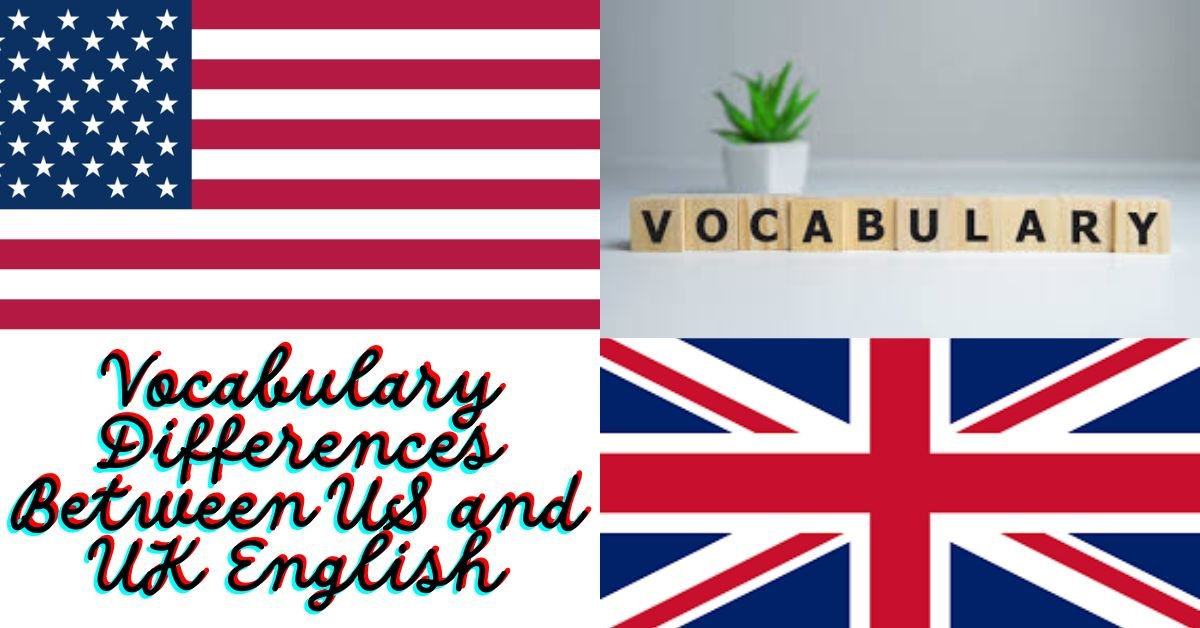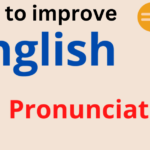Vocabulary Differences Between US and UK English
As you all know there are a lot of Vocabulary Differences Between US and UK English, and it is because these are two different accents. In this specific post we’lll discuss about Vocabulary Differences Between US and UK English.
Ever watch a British baking show and raise an eyebrow at “biscuit” when they clearly mean “cookie”? Or maybe you’ve chuckled at an American tourist asking for “chips” and ending up with fries. These are just a few examples of the delightful (and sometimes confusing) vocabulary differences between US and UK English. While both dialects stem from the same root, they’ve evolved over centuries across the Atlantic, creating a fun linguistic dance for anyone who wants to master both.
This guide isn’t just about amusement, though! Understanding these vocabulary differences can be a game-changer when traveling, watching international media, or simply wanting to impress your friends with your knowledge. So, grab a cuppa (tea in the UK, coffee in the US!) and get ready to dive into the fascinating world of US vs. UK English! We’ll explore common word variations, delve into some fun idioms, and equip you with the knowledge to navigate conversations across the pond like a seasoned pro. After all, a little bit of vocabulary awareness can go a long way in ensuring clear communication and avoiding any transatlantic misunderstandings.
The first word is of Us and the second is of the UK.
Let’s start our journey to explore Vocabulary Differences Between US and UK English. In this post, you’ll learn all the Vocabulary Differences Between US and UK English.
Start the journey to Vocabulary Differences Between US and UK English
Apartment vs. Flat (US vs. UK) – A dwelling unit within a larger building
Schedule vs. Programme (US vs. UK) – A plan of events
Sidewalk vs. Pavement (US vs. UK) – The path for pedestrians next to a road
Theater vs. Theatre (US vs. UK) – A place for performances
Pants vs. Trousers (US vs. UK) – Lower garment covering the legs (pants refers to underwear in UK)
Subway vs. Tube (London)/Underground (elsewhere) (US vs. UK) – An underground rapid transit system
Trunk (US) vs. Boot (UK): The rear compartment of a car for storage.
Pacifier (US) vs. Dummy (UK): A soother for babies.
French Fries (US) vs. Chips (UK): Deep-fried potato strips.
College (US) vs. University (UK): Generally, US colleges offer undergraduate degrees, while universities offer both undergraduate and postgraduate degrees. However, there can be exceptions.
Store (US) vs. Shop (UK): A place to buy goods. “Store” can also refer to a larger establishment in the US.
Movie Theater (US) vs. Cinema (UK): A place to watch movies.
Subway (US) vs. Tube (London)/Underground (elsewhere) (UK): An underground rapid transit system.
Math (US) vs. Maths (UK): The study of numbers and their properties.
Gas (US) vs. Petrol (UK): Fuel for gasoline-powered vehicles.
French Dressing (US) vs. French Dressing (UK) (less common): A salad dressing flavored with vinegar and herbs.
Elevator (US) vs. Lift (UK): A platform that moves people or goods vertically.
Semester (US) vs. Term (UK): A division of the academic year. The US typically has two semesters, while the UK has three terms.
Attorney (US) vs. Solicitor (legal matters)/Barrister (court appearances) (UK): A legal professional.
Candy (US) vs. Sweets (UK): Confectionery items.
Schedule (US) vs. Schedule (both are used)/Programme (UK): A plan of events.
Sidewalk (US) vs. Pavement (UK): The path for pedestrians next to a road.
The Rub (UK) vs. A Hitch (US): An obstacle or difficulty.
On Holiday (UK) vs. On Vacation (US): Taking a break from work or school.
Trash (US) vs. Rubbish (UK): Discarded items.
Apartment (US) vs. Flat (UK): A dwelling unit within a larger building.
Storefront (US) vs. Shopfront (UK): The front of a shop facing the street.
Zip Code (US) vs. Postcode (UK): A code used to identify a specific geographical area for postal deliveries.
Semester Break (US) vs. Half Term (UK): A short break within the academic term.
College Dorm (US) vs. Halls of Residence (UK): Student accommodation on a university or college campus.
Hardcover Book (US) vs. Hardback Book (UK): A book with a stiff cover.
Doorknob (US) vs. Doorknob (both are used)/Door Handle (UK): The handle used to open a door.
Restroom (US) vs. Toilet (UK): A room with a toilet and often a sink. “Restroom” can also be a more general term for any public bathroom in the US.
High School (US) vs. Secondary School (UK): A school for students typically aged 14-18.
Elementary School (US) vs. Primary School (UK): A school for students typically aged 6-11.
License Plate (US) vs. Number Plate (UK): The plate on a motor vehicle that displays its registration number.
Pants (US) vs. Trousers (UK): Lower garment covering the legs (pants refers to underwear in UK).
Sweater (US) vs. Jumper (UK): A knitted garment for the upper body.
Cookie Dough (US) vs. Biscuit Dough (UK): Uncooked dough used to make cookies or biscuits.
Basement (US) vs. Cellar (UK): A room below the ground floor of a building.
**Attorney General (US) vs. Attorney General
Grocery Store (US) vs. Supermarket (UK): A large store selling a variety of food and household goods. “Grocery store” can also be used in the UK, but “supermarket” is more common.
Hardcover Book (US) vs. Hardback Book (UK): A book with a stiff cover.
Gas Station (US) vs. Petrol Station (UK): A place to buy fuel for vehicles.
Highway (US) vs. Motorway (UK): A high-speed, limited-access road.
Faculty (US) (teachers) vs. Staff (UK): The people who work at a university or college. “Faculty” can also be used in the UK, but “staff” is more general.
Candy Bar (US) vs. Chocolate Bar (UK): A bar of chocolate or other sweet treat.
Yard (US) vs. Garden (UK): An outdoor area of land around a house. “Yard” can also be used in the UK, but “garden” is more common for a cultivated space.
Subtitles (US) vs. Subtitles (both are used)/Closed Captions (UK): Text displayed on the screen that translates dialogue or provides additional information.
Draft (beverage) (US) vs. Draught (UK): A beer or other drink served on tap.
Complimentary (free) (US) vs. Complimentary (both are used)/On the House (UK): Given for free.
Restroom (US) vs. Toilet (UK): A room with a toilet and often a sink. “Restroom” can also be a more general term for any public bathroom in the US.
Tennis Shoe (US) vs. Trainer (UK): A shoe designed for athletic activities.
Blimp (US) vs. Airship (UK): A large, non-rigid airship.
Attorney General (US) vs. Attorney General (both are used)/Lord Chancellor (UK): The chief law officer of a country.
College Dorm (US) vs. Halls of Residence (UK): Student accommodation on a university or college campus.
Complimentary (free) (US) vs. Complimentary (both are used)/On the House (UK): Given for free.
Hardcover Book (US) vs. Hardback Book (UK): A book with a stiff cover.
Doorknob (US) vs. Doorknob (both are used)/Door Handle (UK): The handle used to open a door.
Storefront (US) vs. Shopfront (UK): The front of a shop facing the street.
Zip Code (US) vs. Postcode (UK): A code used to identify a specific geographical area for postal deliveries.
Semester Break (US) vs. Half Term (UK): A short break within the academic term.
Draft (beverage) (US) vs. Draught (UK): A beer or other drink served on tap.
Math (US) vs. Maths (UK): The study of numbers and their properties.
Schedule (US) vs. Schedule (both are used)/Programme (UK): A plan of events.
Trash (US) vs. Rubbish (UK): Discarded items.
Trunk Line (US) vs. Mainline (UK): The main telephone line entering a building.
Flash Drive (US) vs. Memory Stick (UK): A portable device for storing digital data.
Stroller (US) vs. Pushchair (UK): A small, wheeled carriage for transporting a baby or young child.
Paperback (US) vs. Paperback (both are used)/Softcover (UK): A book with a flexible cover.
Bumper Sticker (US) vs. Bumper Sticker (less common)/Sticker (UK): A sticker applied to the bumper of a car.
Eavesdrop (US) vs. Eavesdrop (both are used)/Listen in Secretly (UK): To listen to a private conversation secretly.
Hardcover Book (US) vs. Hardback Book (UK): A book with a stiff cover. (We snuck this one in again, but it’s a common difference!)
Takeaway (UK) vs. Takeout (US): Food prepared and purchased to be eaten elsewhere.
Crisps (UK) vs. Potato Chips (US): Thin, sliced potatoes fried or baked crisp.
Chips (US) vs. Crisps (UK): Thick-cut potato wedges fried or baked. (Yes, chips have a double meaning!)
Takeaway Menu (UK) vs. Takeout Menu (US): A menu for food prepared to be eaten elsewhere.
Kerb (UK) vs. Curb (US): The edge of a pavement next to the road.
Bonnet (UK) vs. Hood (US): The cover over the engine of a car.
Petrol Station (UK) vs. Gas Station (US): A place to buy fuel for vehicles.
Mobile Phone (UK) vs. Cell Phone (US): A portable telephone.
Motorway (UK) vs. Highway (US): A high-speed, limited-access road.
Roundabout (UK) vs. Traffic Circle (US): A circular intersection where traffic flows in one direction around a central island.
Bin (UK) vs. Trash Can (US): A container for rubbish.
Chipshop (UK) vs. Fries Stand (US): A fast-food restaurant specializing in fried potatoes.
Underground (UK) vs. Subway (US) (mostly used in New York City): An underground rapid transit system.
Conclusion
The English language, like a well-traveled suitcase, picks up souvenirs along the way. Across the vast Atlantic Ocean, Vocabulary Differences Between US and UK English have emerged, adding a layer of intrigue for language learners and seasoned speakers alike. While an American tourist can understand a London cabbie, and vice versa, vocabulary differences can occasionally cause confusion or amusement. Understanding these variations can elevate your communication skills and make you a more versatile language user.
Vocabulary Differences Between US and UK English extend beyond food and clothing. Looking for a public restroom? In the US, you’d head for the “restroom,” while the UK uses “toilet.” Planning a trip? An American would pack for “vacation,” while a Brit would be preparing for their “holiday.”
Understanding these Vocabulary Differences Between US and UK English is not just about memorizing synonyms. It’s about appreciating the cultural nuances embedded within language. Think of it like adding colorful spices to your communication – it makes things more interesting and flavorful!

Embrace the adventure of Vocabulary Differences Between US and UK English. Learning these variations not only strengthens your communication skills but also fosters a deeper appreciation for the rich tapestry of the English language. So, the next time you encounter an unfamiliar word, don’t be afraid to ask! After all, that’s how the most seasoned travelers explore new destinations – by embracing the unexpected and learning along the way. Let’s close our post Vocabulary Differences Between US and UK English
For more knowledge click the links given below! I have also written posts on Idioms for emotions, Idioms for jobs, Idioms for business, Idioms for relationships, Idioms for love, Idioms for fun, Idioms for education, Idioms for health, Idioms for success, Idioms for colors, Also posts on UK vs US English differences. American and British English Differences. You can just click and read these posts.
I hope you liked the post “Vocabulary Differences Between US and UK English”. If you learned knowledge don’t forget to share it with your friends and also share this post ” Vocabulary Differences Between US and UK English ” with others. Stay happy, Stay successful.








I real pleased to find this website on bing, just what I was looking for : D as well saved to my bookmarks.
F*ckin¦ awesome issues here. I am very satisfied to see your post. Thank you so much and i’m looking ahead to contact you. Will you please drop me a e-mail?